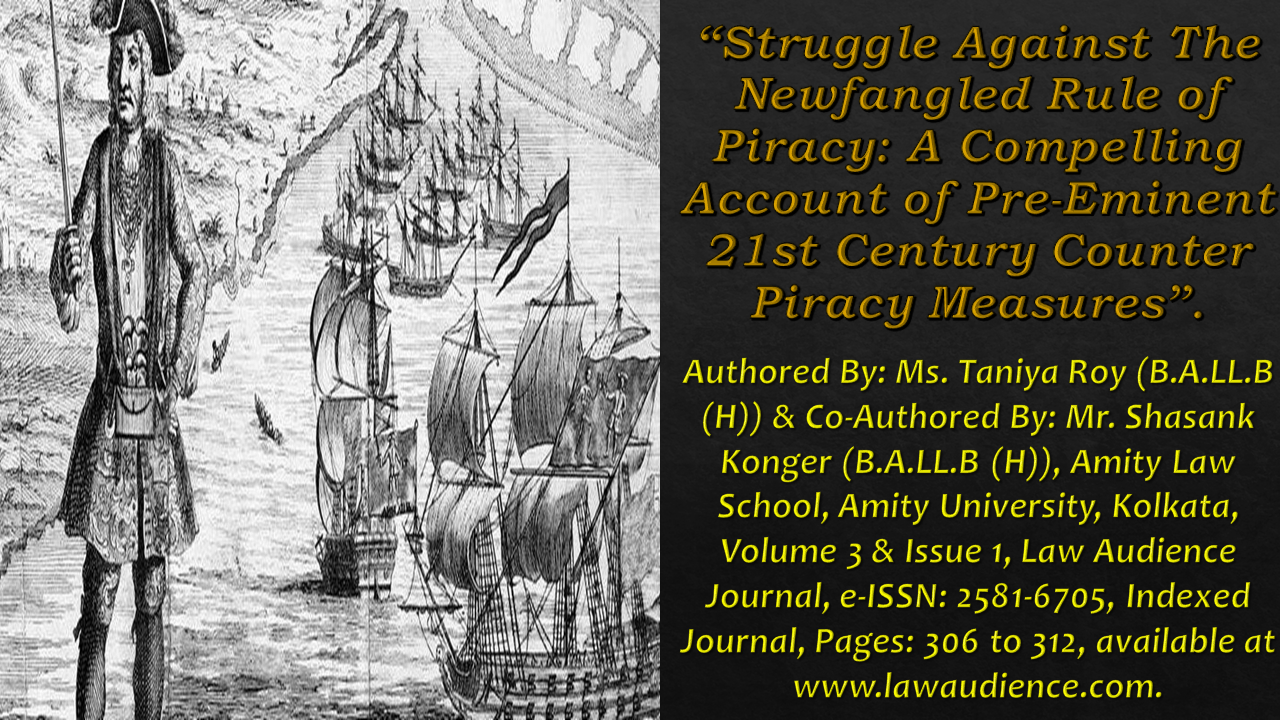Click here to download the full paper (PDF)
Authored By: Ms. Taniya Roy (B.A.LL.B (H)) & Co-Authored By: Mr. Shasank Konger (B.A.LL.B (H)), Amity Law School, Amity University, Kolkata,
Click here for Copyright Policy.
ABSTRACT:
“The crime of piracy, as we know it today, is particularly international in nature. However, the same has not been the stance, but has only recently been adopted to befall under this domain. To ensure that principles of international law are followed in dealing with crimes of this genre, it is essential to have access to conventions whose scope is wide and broad to accommodate any permutation and combination of issues. The scope and purpose of this article go beyond the traditional conventions. Where the UNCLOS and SUA Conventions are usually triggered post an incident, these distinctive initiatives, as described in the paper, are directed to prevent and minimise the opportunity of an attack in the first place. A closer look at these relatively lesser-known counter-piracy measures has been the Centre of attention in this article”.
Keywords: Piracy, International Law, UNCLOS, SUA, Counter-Piracy.
I. INTRODUCTION:
Piracy has been an age-old issue that has compelled international communities and organisations alike, to brainstorm a streamlined set of solutions, in an effort to tame the predicament. The vast nature of the high seas makes it extremely difficult to establish jurisdiction of one state, organisation or a single set of regulatory provisions alone. This is where global as well as regional initiatives come into play. States are engaged in partnerships, bilateral and multilateral agreements and treaties, that ensure a joint venture to take necessary action to reallocate, recuperate and reorganise their resources.
The United Nations Convention on the Law of the Sea, 1982, (UNCLOS) and the Convention for the Suppression of Unlawful Acts Against the Safety of Maritime Navigation, 2005, (2005 SUA Convention), act as the two main Conventions that are referred to during incidents of piracy as well as armed robbery on the high seas. These lay down the appropriate protocol, definitions and jurisdictions, in order to mitigate the ginormous probabilities of complex interpretation. However, States recognised the fact that the issues of piracy were not exhaustive, unlike these Conventions. The onus to extend protection against transgressions occurring in their territorial and adjacent waters was upon them. The succeeding sections deliberate some such notable initiatives that were adopted by the regional communities, to alleviate, and to a certain extent, vanquish the unqualified rule of pirates on the high seas.
II. EARLY ATTEMPTS:
One of the earliest attempts to bring reform to maritime regulation and deploy measures to counter piracy was introduced through the Regional Cooperation Agreement on Combating Piracy and Armed Robbery against Ships in Asia (ReCAAP). ReCAAP was the first inter-governmental agreement, launched in 2006, where 14 Asian States collaborated to share information, build capacity and extend mutual assistance, specifically to deal with issues of piracy and armed robbery throughout Asia. Over time, the member countries of the Agreement have increased, not limiting itself to States within Asia, but allowing Countries from other continents to join forces to mitigate effects of major maritime threats. Singapore hosts the ReCAAP Information Sharing Centre (ReCAAP ISC), that acts as the focal point of action.[1] ReCAAP is famously known for conducting various capacity building workshops, that enable participating countries and their delegates to gather deeper knowledge on new and evolving aspects in the field, that may be used to their advantage.
The Djibouti Code of Conduct (DCOC) or the Code of Conduct concerning the Repression of Piracy and Armed Robbery against Ships, was adopted by approximately 20 countries, mainly in the Middle East region of Asia, and East Africa, in 2009. This was a joint effort on behalf of the States suffering from the issue of piratical attacks, on vessels and cruises passing through the Gulf of Aden and the Red Sea. An initiative of the International Maritime Organization (IMO) was aimed as an early commitment to repressing crimes falling under this category.[2] An amendment made in 2017, more commonly known as the ‘Jeddah Amendment’, allowed expansion for the field of reference of the Code, to avow the importance of ‘blue economy’ and condemn other illicit activities, like human trafficking, illegal and unregulated fishing, amongst other maritime security issues.[3] India is amongst the five observer members of the DCOC, whose sole objective as an observer is to enhance maritime security in this region, as escalation of disturbances through the passage directly or indirectly affects trade and economies of the respective countries.[4]
Although, both of the above-mentioned agreements were quite ambitious in their intention, they were unable to administer the onslaught of infractions that were on the rise during the first decade of the 21st Century, especially during the period of 2009 to 2012. This period is recorded as a highly volatile period for incidents of piracy, involving attacks like that of MV Maersk Alabama and MV Iceberg 1. Observable failure could be attributed to the absence of some of the key participants from the agreements and undermining the potential of the pirates, acquired through unsubstantiated funding from ex-pats and the Middle East, which, hence, failed to achieve considerable success in its functioning.
III. NOTEWORTHY COUNTER-PIRACY MEASURES IN THE LAST DECCADE:
Since 2012, a striking decline in the number of piracy attacks have been observed in the Indian Ocean region. Subsequent to 2013, the region has seen the introduction of three Naval Task Forces that have contributed significantly to the purpose, namely, the Combined Task Force (CTF) 150 (maritime security and counter-terrorism), CTF 151 (counter piracy) and CTF 152 (Arabian Gulf security and cooperation).[5] These three task forces were introduced by the Combined Maritime Forces (CMF), which was established as a multi-national naval partnership that existed to promote security, stability and prosperity across far-reaching international waters which covers few of the world’s most vital shipping areas.[6] CMF is a flexible organisation, and the member nations who are parties to CMF are not bound by any political or military mandate, and the nations can contribute assets as per their ability to contribute. European Union Naval Task Force, introduced under ‘Operation Atalanta and Combined Task Force 151’ together, aimed at deterring piracy at sea. The EU Naval Task Force, which was established in the year 2008, was a counter piracy military operation at sea. Operation Atalanta, which is formally known as the European Union Naval Force (EU NAVFOR) Somalia, is an existing counter-piracy military operation at sea in the Horn of Africa and in the Western Indian Ocean region. This is the first naval operation which was conducted by the European Union (EU). EU NAVFOR is based on Decisions by the Council of the European Union in accordance with relevant United Nations Security Council Resolutions (UNSCR) and International Law.[7] Its core mission was to protect vessels of the World Food Programme, followed by deterrence, prevention and repression of piracy and to protection of the vulnerable vessels.
In the ‘Area of Operations’, the units of EU NAVFOR can make an arrest, detain and transfer persons who are suspected of committing, intending to commit, or having committed acts of piracy or armed robbery at sea. The assets of EU NAVFOR can seize vessels of suspected pirates or armed robbers, vessels captured by an act of piracy or armed robbery at sea, and such vessels which are in the hands of the pirates or armed robbers, along with the property on board.[8] The prosecution of suspects can be done by an EU Member State, by regional states, or by any other third state, with which the EU has an agreement, and which desires to exercise its jurisdiction over the suspected perpetrators. Suspected pirates may be transferred to a third state only when conditions are relevant to international law, i.e., when international law on human rights are met.
In January 2011, the reports of piratical attacks in Somalia were at the highest ceiling, which included 736 hostages and 32 ships who were being held by pirates. However, by October 2016, the number had dropped to zero hostages and ships being held. Again in 2017, there were two successful attacks off the coast of Somalia, one of them being the capturing of the Aris 13 tanker, which was voluntarily released. This initiative was successful in curbing the number of piratical attacks to a large extent, and therefore, on 1st Jan 2021, the mandate of the EU Naval Force Somalia, Operation Atalanta, had been extended for another two years, i.e., until 31st Dec, 2022.
Following in these footsteps, the ‘Shared Awareness and Deconfliction’ (SHADE), was identified as another conference which was at the rudder of initiating counter-piracy operations coordinated through monthly planning. SHADE, is a forum which brings together nations, international organisations and members of the shipping industry who share a common interest in combating piracy and broader maritime security issues. Earlier, only the NATO (North Atlantic Treaty Organization), EU and CMF were parties to the conference, but now has been extended and supported by over 20 countries.
However, Europe was not the only region beyond the East African coastline that felt the effects miles away. Thereafter, China deployed an Overseas Military Base in Djibouti, only one of its kind to Counter piracy in the Gulf of Aden and the Horn of Africa, as China’s shipping vessels were at constant threat and China felt the aftershocks often. In the last SHADE Conference i.e., the 47th SHADE Conference on Maritime Security which was held in November 2020, the CMF commander, during his opening statement at the conference, amongst all other things stated that the suppression of piracy was a shining example of the benefits of the combined efforts of the EU and CMF and other individual nations.
The then Deputy Commander of the Combined Maritime Forces said that “While piracy is suppressed, the threat remains,” and that Forums like the SHADE Conference were crucial in order to bring members of the maritime industry and militaries together to ensure a consensual approach in maintaining maritime security, especially during the additional challenge of Covid-19.[9]
As for the decline in rates of Somali pirates, once the Puntland region was able to gain a sense of stability with the election of a new administration, its primary objective became introducing anti-piracy campaigns, which forced them into the Galmudug region. A combination of effective naval patrolling, marine capacity building and best management practices in the piracy HRA (High Risk Area) can be identified as the main measures employed to control piracy, to the current extent.
IV. CONCLUSION:
Post 2012, an evident dip in the graph of piracy across the globe was observed. Except for the occasional unsuccessful attacks on a few ships, no significant loss to major vessels and trawlers was reported. However, the pandemic has acted as a signal to many of these agencies, who had chosen to remain dormant preceding this particular era. This could come as a result of one of two major causes that we believe could have caused it. Firstly, countries have had to allocate their resources in other places, to help its domestic populations, and even retreat from various posts, for economic, health and safety purposes, then to regulate the high seas and territorial waters with the same vigour as before.
Secondly, the desperation and unrest amongst the perpetrators has escalated exponentially. The previous year alone experienced a 24% jump in irregular activities in these domains, as compared to the year preceding that.[10]
Although the situation is not as bad as it was during the peak of piracy, especially during the stretch of 3 years between 2009 and 2012, it is worthy enough to draw attention of regulating authorities, governments and vessel owners, to ensure that this does not evolve into a situation we can no longer control, without resorting to the ultimate mode of violence and warfare.
Footnotes:
[1] About ReCAAP Information Sharing Centre |combating maritime robbery, sea piracy, https://www.recaap.org/about_ReCAAP-ISC, (Accessed on May 18, 2021).
[2] The Djibouti Code of Conduct, International Maritime Organisation, https://www.imo.org/en/OurWork/Security/Pages/Content-and-Evolution-of-the-Djibouti-Code-of-Conduct.aspx, (Accessed on May 18, 2021).
[3] Ibid.
[4]India joins the Djibouti Code of Conduct as Observer, Ministry of External Affairs, https://www.mea.gov.in/press-releases.htm?dtl/32977/India+joins+the+Djibouti+Code+of+Conduct+as+Observer, (Accessed on May 18, 2021).
[5] Combined Maritime Forces, https://www.cusnc.navy.mil/Combined-Maritime-Forces/ (Accessed on May 19, 2021).
[6] Ibid.
[7] EUNAVFOR, https://eunavfor.eu/mission/ (Accessed on May 20, 2021).
[8] Ibid., at 4.
[9] CMF and EU NAVFOR host 47th SHADE Conference on Maritime Security, https://eunavfor.eu/cmf-and-eu-navfor-host-47th-shade-conference-on-maritime-security/#:~:text=%E2%80%9CWhile%20piracy%20is%20supressed%2C%20the,of%20the%20Combined%20Maritime%20Forces. (Accessed on May 21, 2021).
[10] Piracy is on the rise, and coronavirus could make it worse, https://www.weforum.org/agenda/2020/05/global-sea-piracy-coronavirus-covid19/, (Accessed on May 23, 2021).
Cite this article as:
Ms. Taniya Roy & Shasank Konger, Struggle Against The Newfangled Rule of Piracy: A Compelling Account of Pre-Eminent 21st Century Counter Piracy Measures, Vol.3 & Issue 1, Law Audience Journal, Pages 306 to 312 (5th July 2021), available at https://www.lawaudience.com/struggle-against-the-newfangled-rule-of-piracy-a-compelling-account-of-pre-eminent-21st-century-counter-piracy-measures/.



